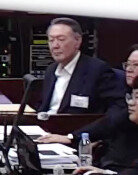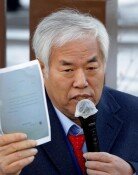[Opinion] Did We Forget the `Debt of 6.25`?
[Opinion] Did We Forget the `Debt of 6.25`?
Posted June. 26, 2002 22:32,
It was the 52nd anniversary of the 6.25 on the 25th. It is the year the whole country is shrouded in the heat of the World Cup so it is almost impossible to find a decent academic seminar to commemorate the 6.25.
Although the World Cup became an event with meanings in the world history, the 6.25, which happened in this land a half century ago, was the shocking incident in the world history. The difference is the World Cup is a global ‘festival,’ but the 6.25 was a miserable tragedy.
Germany, which was compared to when we discussed about the reunification, finished the cold war in 1989 and achieved the reunification. Unlike that, the cold war is still going on in the Korean Peninsula, and the South and North relationship is still at a standstill despite of the Sunlight Policy of the current government and the South and North Summit in 2000.
There was a sign of reconciliation and cooperation after the Summit; however, the South and North relationship came to a standstill after the departure of the George W. Bush administration, and the tension between two was intensified after President Bush’s utterance of the ‘axis of evil.’
There are many reasons why the situations of Korea and Germany are so different, but the 6.25 is the definite one. If we did not have the fratricidal tragedy, the divided system could not be this firm. Or, if the 6.25 had been just an internal fight between the two powers, there might have been a solution.
Today’s super powers such as the US, the USSR, China, The UK, Japan, and so on were involved in the 6.25; therefore, it became more complicated to break the stabilized divided system in the Korean Peninsula.
During the 6.25, then the US President Harry Truman said, “We are fighting to prevent the World War III.” That utterance showed that the 6.25 was an international war with a meaning of a ‘proxy war.’
The 6.25 solved the problem that the capitalism had faced at the end of the 1940’s, and it definitely affected to form a new world order after the World War II. If there were no 6.25, Japan and Germany, the defeated nations of the World War II could not be reconstructed so soon. It would be difficult to build the American hegemony. It is questionable whether the capitalistic world could be existed this firmly.
America could not build ‘the world order that America lead’ until the end of the 1940’s. In 1949, right before the 6.25, America herself experienced a serious economical slump. The major European capitalist countries also could not escape from the dilemmas of economical crisis and political and social confusion.
It was not much different in Japan, China, and the Soviet Union. In the major capitalistic countries, Bourgeois and counties had serious crisis of their justness. In short, the capitalism itself was in danger.
The 6.25 played a critical role to solve many problems to put the capitalistic world in danger at the end of the 40’s such as impoverishment of Europe and Japan, economical slump in the US, and the crisis of justness of bourgeois and capitalistic countries. Japan and Europe succeeded the economical reconstruction through the ‘6.25 boom.’
America overcame the economical slump by the rearmament program. With the 6.25, America was able to build the world order centering around her. The capitalistic world system had a golden age after the 6.25. The world capitalism was built at the sacrifice of the Korean Peninsula.
At this stage, ‘money’ is the key to develop the South and North relationship. The Sunlight Policy of the Kim Dae-Jung administration was successful at that, because Pyongyang ‘calculated money.’ North Korea needs economical support badly. However, this administration does not have the ability to support North Korea. It is natural that the South and North relationship is standstill.
The surrounding super powers have allowed the development of the South and North relationship in the ‘reasonable’ scope that they do not have to pay any economical expenses. The ‘cooperation of Korea, America, and Japan’ of promoting the Sunlight Policy was at this dimension. Right now, Korea assumes almost every thing that required some money including the Korean Peninsula Energy Development Organization. America and Japan are very stingy about the things that require money considering their influences over Korea.
If we remind the world historical meaning of the 6.25, the surrounding super powers have debts to the Korean Peninsula.
Especially, America and Japan should remember their past that rose again by stepping on the tragedy of the Korean Peninsula some 50 years ago.
Is the stingy Korean Peninsula policy like this a conduct of losing the sight of the history?



![[속보]국힘 윤리위, 한동훈 제명 결정…장동혁호 ‘뺄셈 정치’ 가나](https://dimg.donga.com/c/138/175/90/1/wps/NEWS/IMAGE/2026/01/14/133151701.1.jpg)



